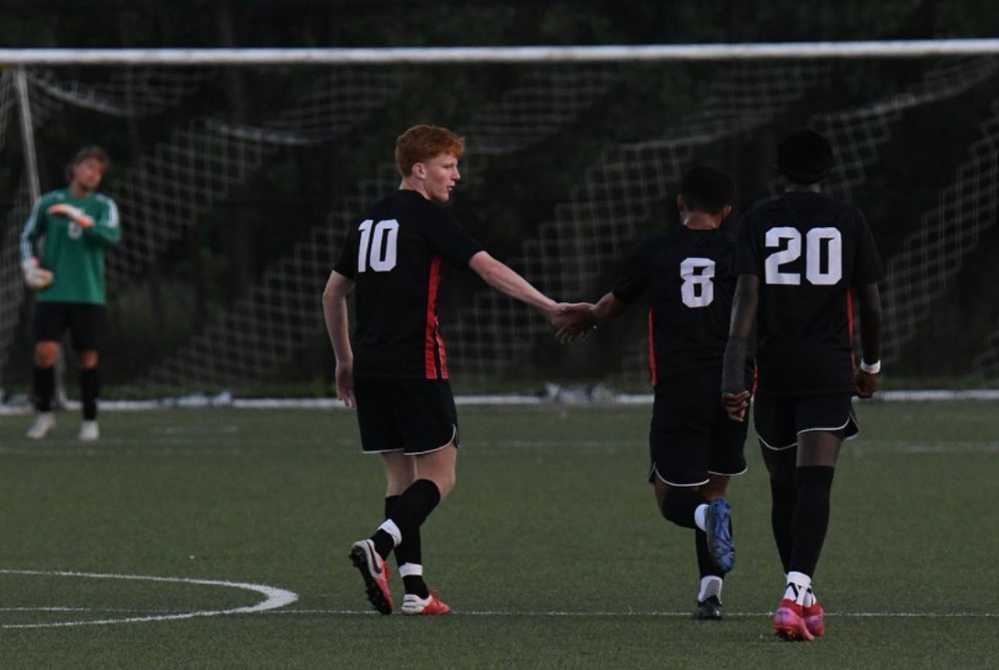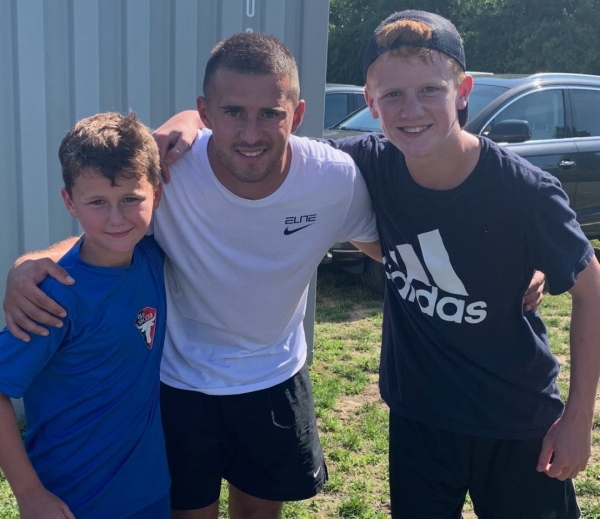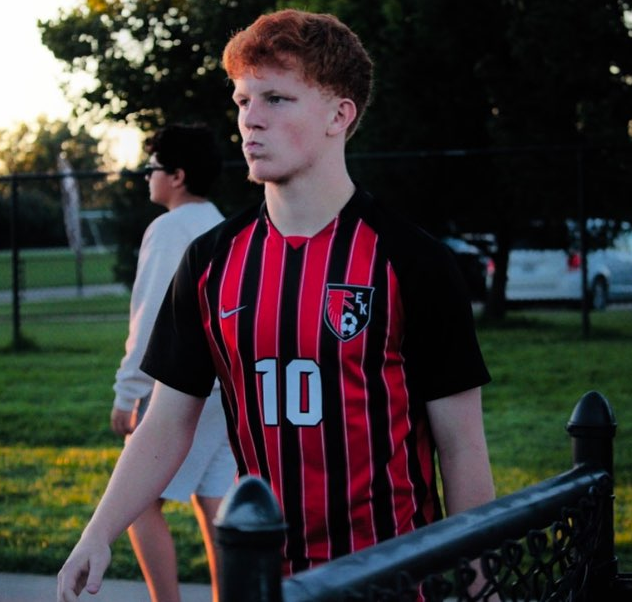
MHSA(Q&)A: Soccer Coaches President Zach Jonker
September 21, 2012
By Geoff Kimmerly
Second Half editor
Zach Jonker has had his hands – or, perhaps, feet – on just about every facet of soccer in this state over the last 20 years.
 He played on a Class B Semifinalist at Petoskey before graduating in 1995, then earned four letters and served as a captain at Hope College. He came back home to teach social studies and became coach of both boys and girls varsities that are regularly among the northern Lower Peninsula's elite, but also are highly-regarded statewide. And this fall, he began the first of a two-year term as president of the Michigan High School Soccer Coaches Association.
He played on a Class B Semifinalist at Petoskey before graduating in 1995, then earned four letters and served as a captain at Hope College. He came back home to teach social studies and became coach of both boys and girls varsities that are regularly among the northern Lower Peninsula's elite, but also are highly-regarded statewide. And this fall, he began the first of a two-year term as president of the Michigan High School Soccer Coaches Association.
So he can speak first-hand on the benefits of playing high school soccer in Michigan, which is good news to get out perhaps now more than ever. Michigan high school soccer is facing a predicament unlike any it has tackled before – the creation by U.S. Soccer of its Development Academy, a set of travel teams all over the country that train nearly year-round and are meant to eventually fuel the men's national team. That opportunity has drawn a number of top Michigan players out of high school soccer.
Jonker and his coaching brethren are monitoring that situation closely, while continuing to lead their teams into the second half of this fall boys season. His Northmen are 6-7-1 overall this fall, but have faced three of the top-five ranked teams in Division 1 and another from Division 2.
Despite your location near the tip of the Lower Peninsula, you still manage to schedule strong competition. How do you make it work?
We’re in a really nice spot. Traverse City hosts a tournament during the regular season with Traverse City Central, Traverse City West and Petoskey, and then they invite three schools from downstate that have generally been (Warren) DeLaSalle, Clarkston and Ann Arbor Skyline. The following weekend, we host a similar format with Rochester Hills Stoney Creek and Bloomfield Hills Lahser. We get six really good games at the start of the season with two tournaments. It’s early in the season and teams love coming up, making a weekend out of it, hitting the beach and doing some bonding. And the fields at Traverse City and Petoskey are both beautiful, which helps teams commit, plus the three of us are very competitive.
We’re coming down next weekend to play East Lansing, and we always schedule a couple of those. Last year, Mason came up here. It’s definitely a commitment in terms of travel during the course of the year, but from a Petoskey standpoint, I don’t care about our nonleague record. We’re using those games to get better for our league and better for the (MHSAA) tournament. The only tough thing is putting that in perspective for the kids.
What is something happening in high school soccer that the coaches association is proudest about right now?
We’re always looking at it from the other side, what we want to make better. But one of our main goals as an association is to properly recognize players. And I think the process we have in place for giving all-district, all-regional and all-state recognition and ultimately the selection of the Dream Team, I think that’s a very good model that enables us as an association to truly recognize players who put the work in and had a successful season. We also redesigned our web site this past season, and we’ve done a lot of the all-state process online, which a lot of coaches really liked because it cut down travel time for meetings.
Is anything new on the horizon?
A lot of coaches are really interested in seeing what the long-term impact of the (U.S.) Academy ruling is. Everyone’s initial take is we’re seeing increased parity round the state as the result of 120 kids electing not to play high school soccer this year. Obviously, all of those players are good players playing at a high level, and people are interested in seeing at the end of the season if kids are going to have missed playing in front of their communities, and if kids are going to migrate back to high school soccer. There’s talk of U.S. Soccer adding a U-14 academy. They’re trying to expand.
What has been the reaction so far to the U.S. Academy?
For certain players, the academy makes sense. They’re in a professional training environment 10 months out of the year. But those guys not on the professional track would be equally served by playing high school soccer and playing club like we always have. (U.S. Soccer) is doing a lot of this to benefit the top one percent of players. It’s the main frustration from the coaches.
Everyone kind of understands why U.S. Soccer is headed down that path, and it impacted each (high school) team differently. Some programs lost upwards of 8-10 kids as a result. Some didn’t lose any.
In terms of geographic parity, we’re already seeing that. Two years ago, west side teams won all four championships. Last year, Detroit teams won all four. Now we’re going to see more parity within districts, within conferences. And I think we’ll see scores closer than in the past.
What role should high school soccer play compared to club, the academy, etc.?
I equate it as playing for your national team. When you put your school colors on, go out with your friends that you’ve played with since kindergarten, it’s really special. They can’t even begin to match the rivalries we have with high school soccer, the amount of passion that exists within our game and the number of fans that show up at these games. At an academy game, you might have a handful of parents on the sideline, that’s it, and a few college coaches watching. But you can’t match the high school experience and the passion that exists. Kids are going to miss that, and we’ll get kids back because of that.
Do your players see an MHSAA championship differently because so many elite players aren’t participating in high school?
It doesn’t even register with these guys. The (MHSAA) championships are going to be awarded in November, and for whoever wins this year, it will be just as meaningful for these guys as the guys who won last year.
Does soccer get a bump from U.S. national team success like swimming or gymnastics might during Olympic years?
Any time it’s a World Cup year, men’s or women’s, the players get really excited about the experience. It gets them enthused to get out and train. I don’t think kids watch enough soccer in this country, and that’s one of the big issues we have. Ultimately, what’s holding us back at the national team level is kids are not growing up in a culture of soccer on television like in other countries against which we compete. In a World Cup year, kids get excited, and they watch more soccer, and the play is better on the field.
How much has high school soccer changed since you played?
There are just so many more layers of sophistication, tactically. We had good athletes playing at that point, and we have good athletes playing now. But as a country, we’ve evolved from a coaching standpoint. The kids are getting better technical training at a younger age, and are much better tactically. There are many more teams now emphasizing more possession-based (play). What else has helped the evolution is getting off playing on football fields. During the (19)80s and 90s, a lot of games were played on them, and it made it hard to possess the ball when the turf was chewed up. Soccer-specific fields have helped the game evolve.
What will Michigan high school soccer look like five years from now?
I like the path we’re headed down. The number one thing going forward is seeing what happens with the evolution of the academy program – do kids come back, or does the academy program grow? Regardless, the kids playing high school soccer are going to have a great experience, and there are a lot of really good coaches in high school soccer, a lot of really great referees and administrators. That makes the game special. I see us continuing to have the best going forward.

PHOTO: Petoskey senior Noah Honaker goes high while surrounded by defenders to head a ball during a game this season. (Photo courtesy of Dean Viles.)

East Kentwood Soccer Provides Conlon Bridge Back to Health, Top Form
By
Dean Holzwarth
Special for MHSAA.com
October 18, 2023
KENTWOOD – Six months ago, East Kentwood junior standout Brody Conlon couldn’t imagine sprinting down the soccer field and delivering a booming shot to the back of the net.
 An unfortunate diagnosis had put his budding soccer career on pause.
An unfortunate diagnosis had put his budding soccer career on pause.
In January, Conlon was told by doctors that he had ulcerative colitis. The disease prevented him from playing soccer or attending school for five months.
Conlon returned to the sport he loves this fall to help lead the Falcons to a successful season.
“If you told me six months ago that I was able to play 80 minutes, pretty much every game for a whole high school season, I honestly wouldn't believe you,” said Conlon, who recorded 11 goals and 22 assists.
“But high school soccer is so special and was definitely a great way to bring me back into the sport again after being out for such a long time.”
Last November Conlon, a nationally-ranked midfielder, was in Florida with his Midwest United Region II ODP team when he felt sick and his stomach was hurting during games.
He returned home to undergo testing, and after the diagnosis started on a drug protocol and heavy steroids.
Conlon basically was bedridden from January to May.
“I was definitely upset, and it was tough because I couldn't do things that I've always done like soccer and being at school every day. But I learned to cope with it pretty quick and embrace it, and I think I did pretty well getting out of it,” Conlon said. “I kept going through the day like it wasn’t affecting me as much as it was, and eventually I think my mind overcame it.
“The key was staying positive. Negativity builds up so you have to stay positive, even in the tougher moments. That’s when you have to pull through. There were days where I would start to feel better and then I would crash and burn again so it was tough because it was like a mind game, but eventually I got used to it.”
Ulcerative colitis is a chronic inflammatory bowel disease in which abnormal reactions of the immune system cause inflammation and ulcers on the inner lining of the large intestine. It can develop at any age, but the disease is more likely to develop in people between the ages of 15 and 30.
 Conlon is the son of former East Kentwood coach and current Byron Center girls soccer coach John Conlon, who won 376 games guiding the Falcons from 2000-21.
Conlon is the son of former East Kentwood coach and current Byron Center girls soccer coach John Conlon, who won 376 games guiding the Falcons from 2000-21.
“The whole last year has been a bit of a whirlwind,” John Conlon said. “Brody had been telling me for five months that he had a "disease" and it just wasn't diagnosed yet. When we were told by doctors that he had ulcerative colitis, it was a real shock to the system because we truly didn't know much about the disease.
“We were told it was in the same autoimmune class as Crohn's. To be honest, my wife Kelly and I had to read everything we could on it because we were unfamiliar. What stood out right away is that every patient responds differently to the protocols and drug protocols for the disease. He tends to have a pretty severe case.”
The experience took a toll on the family.
“What was hard for me was to see my son struggling physically, and as a parent I could only offer the advice that was given to us by physicians,” John Conlon continued. “In July, we started to see some improvement from the drug Rinvoq. We spoke with Luke Ruff (Brody’s MLS coach) who was amazing and fully agreed that high school would be a good bridge to get Brody back to where he needs to be.”
Brody Conlon showed little effect this fall as he shined while catapulting the Falcons to a 12-5-1 record.
East Kentwood’s season ended with a disappointing 2-0 loss to Byron Center in District play.
“I was definitely happy with how I played, battling two things at once with the pressure of having a good season then also the stomach stuff, but I think I did pretty well with that,” Brody Conlon said. “We had a great season, and soccer can be brutal. You have to be at your best every game, and the state tournament is where you have to be the best at.
“It was tough because no one likes losing, but I was able to play with the guys I’ve known forever so in the end the positives outweigh the negatives in this situation.”
Falcons assistant coach Carl Warfield, who began with the program under John Conlon and has continued the last two seasons with current head coach Giuseppe Barone, said they would pull Brody from games to give him breaks, but "I can count on one hand the number of times this season he asked for one during a game, and even then he wanted right back in to keep supporting the team.
"The days after games could be really tough on him," Warfield continued. "The pain would sometimes keep him from coming to school the day after a game. Brody really has been a study in courage and determination that anyone could draw inspiration from. He has maintained his grades and shown constant leadership all season while dealing with his disease."
Conlon also was dealing with the loss of a former East Kentwood standout who he idolized as a young kid.
Nermin Crnkic, who helped the Falcons win three Division 1 championships and played professionally, was found dead in his apartment in early July after a heart attack.
 “That had a huge effect on me,” Conlon said. “I’ve grown up around Nermin, and he was my idol when I was growing up in soccer. It was definitely a huge blow to me, but it was motivation for me to play and play for him.
“That had a huge effect on me,” Conlon said. “I’ve grown up around Nermin, and he was my idol when I was growing up in soccer. It was definitely a huge blow to me, but it was motivation for me to play and play for him.
“I was number seven my freshman year, but after hearing the news I decided to take number 10 and play for Nermin this year.”
John Conlon is amazed by the way his son has handled his condition.
“Brody is as tough a young man as anyone I have been around,” he said. “He battles this disease every day and has handled it more maturely than I could have at the same age.
“I'm sure there are other athletes out there battling similar diseases or even more difficult situations. I think Brody's goal is to show the world that an obstacle will never stop him, and hopefully that inspires young players. It's the toughest thing I have ever dealt with as a parent, but Brody handles it with dignity and grace.”
Added Warfield: "I have coached a lot of players, but Brody’s determination to compete and not let his disease stop him from playing the game he loves so passionately is truly amazing. He has been an inspiration to every player on the team and (I) truly believe that his efforts and determination were a large part of our success this season."
Brody Conlon said the high school season “took a lot out of me,” but he’s expected to rejoin his club team at some point.
He remains optimistic about his future.
“It's one of those diseases that the doctor says I could have for the rest of my life, or it could just go away,” he said. “I’m just going to keep doing me and being me. Everyone has something that affects them, but you just have to keep pushing through it and better days will come. I’ve progressed a lot this year, and I believe I will keep improving.”
 Dean Holzwarth has covered primarily high school sports for Grand Rapids-based WOOD-TV for five years after serving at the Grand Rapids Press and MLive for 16 years along with shorter stints at the Ionia Sentinel and WZZM. Contact him at [email protected] with story ideas for Allegan, Kent and Ottawa counties.
Dean Holzwarth has covered primarily high school sports for Grand Rapids-based WOOD-TV for five years after serving at the Grand Rapids Press and MLive for 16 years along with shorter stints at the Ionia Sentinel and WZZM. Contact him at [email protected] with story ideas for Allegan, Kent and Ottawa counties.
PHOTOS (Top) East Kentwood’s Brody Conlon (10) returned to the field this fall with his high school team. (Middle) Brody Conlon, far right, takes a photo with past East Kentwood star Nermin Crnkic, center, two summers ago. (Below) Conlon reached double-digit goals and assists this season. (Photos courtesy of the Conlon family.)

